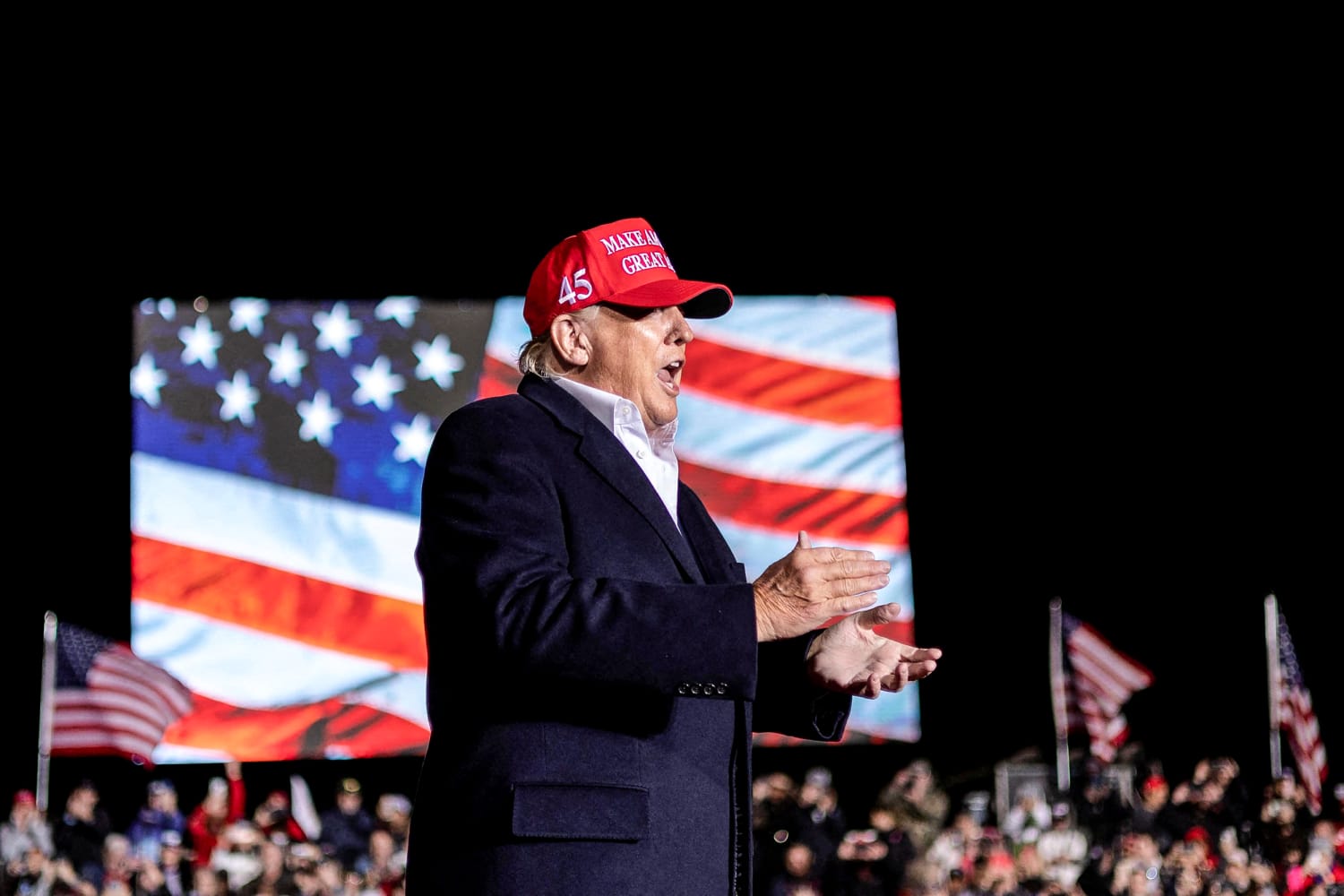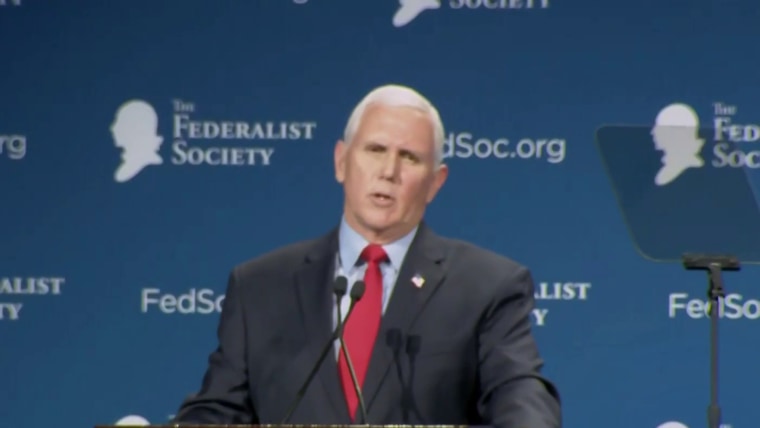FREEPORT, Pa. — In the last presidential election, Donald Trump carried Butler County, where Natalie Franko lives, by 32 points.
“We knew there was cheating, even so,” Franko, 58, said.
She and other like-minded residents coalesced into the Butler PA Patriots, a right-wing group that attends county commissioner meetings to demand investigations into the 2020 count while recruiting people to be poll watchers and candidates for local committees, school board seats and town councils.
On Jan. 28, Franko could be found working the door of a debate her group had organized for Republican candidates seeking statewide office, with tickets going for $20 to $25 each. More than a half-dozen candidates for governor and lieutenant governor showed up for the event, which was moderated by a former Army captain who has pushed a discredited theory claiming proof of widespread voter fraud.
“We, the Butler Patriots, undoubtedly know there was cheating in the 2020 presidential election,” Franko said. “And we are upset.”
More than a year after the vote, no evidence of fraud has emerged in Butler County, nor has any credible evidence of significant fraud been uncovered elsewhere in the 15 months since President Joe Biden’s election. His certified victory has been affirmed in Pennsylvania and other hotly contested swing states in court rulings, recounts and partial audits.
But those data points carried little weight here, as candidate after candidate, including some who were present outside the Capitol on Jan. 6, expressed views on 2020 ranging from doubts about a valid vote to certainty that the election was rigged.
“The big lie is that Biden legitimately won,” Teddy Daniels, a candidate for lieutenant governor, said during the debate. The auditorium cheered.
One year out of office, and with the midterm elections fast approaching, Trump has accelerated efforts to encourage resistance to the reality of his loss. He told his supporters to “never give up” in a statement on the first anniversary of his supporters’ rioting at the U.S. Capitol in a deadly attempt to block the formalization of Biden’s win.
He has sought to make the coming contests revolve around debunked claims of a rigged election, backing a significant number of candidates who have questioned the results. His first rally of the new year, held in Arizona, featured a lineup of election deniers, some of whom he has backed in key statewide races there.
In return, there are signs that his voters’ anger over the 2020 election and their belief in the falsehood that his victory was stolen from him has only grown, even as some in the GOP have said they’d prefer to move on and focus on issues that may resonate with a wider swath of the electorate, like inflation.
“The country is adrift right now,” Melvin Everson, a former Republican state representative in Georgia, said in an interview at a Gwinnett County GOP breakfast. “The election is in the rearview mirror for some but is still at the forefront of the minds of a lot.”
That cuts to a central divide within the Republican Party — how much attention to pay to the last presidential election while seeking to win the next ones. Trump remains the undisputed leader of the GOP and the odds-on favorite to win the 2024 nomination should he run — and he wants 2020 to be front and center. Meanwhile, plenty of Trump-backing Republicans who would prefer to sharpen a forward-looking message have sought to thread the needle by promoting changes to the election process without dwelling on the 2020 results.
An NBC News survey last month suggested that 11 percent of U.S. adults view election integrity as a top-two issue, trailing issues like jobs and the economy, the pandemic, immigration, climate change and taxes and spending.
Sen. Rick Scott, who chairs the National Republican Senatorial Committee, the campaign arm of Senate Republicans, outlined that strategy to reporters on a conference call with Republican National Committee Chairwoman Ronna McDaniel in January.
“We’re going to defend the voter election laws,” Scott, R-Fla., said. “And we’re doing it in a variety of states now. And we’re going to make sure that in the ’22 cycle, ’24 cycle, we want people to vote, but we don’t want anybody’s vote diluted by somebody who doesn’t have a right to vote. We don’t want any cheating.”
For many Republicans skeptical of the electoral results, claims of “cheating” have transitioned from outright ballot stuffing to a sense that the pandemic-inspired expansion of mail-in voting was unfair to Republicans.
At the debates in Freeport, attendees and candidates cheered news of a Pennsylvania court striking down the state’s mail-in voting law earlier in the day, though the decision is on hold as the state appeals to the state Supreme Court. Jason Berger, a long-shot gubernatorial candidate at the event, told NBC News that Biden “cheated fair and square.”
Assurances from Republicans that fraud theories are meritless based on their own investigations, meanwhile, are met with staunch resistance.
In Michigan, Bob Cushman, a 71-year-old retired pilot from suburban Detroit who played a peripheral role in Trump’s efforts to overturn the election results there, called GOP state Sen. Ed McBroom “a liar” after his committee rejected the stolen election conspiracy theory and debunked viral election claims.
At an October question-and-answer session in Tucson, Arizona, with Ken Bennett, a former GOP Arizona secretary of state who was the state Senate’s liaison to amonthslong partisan review ofMaricopa County’s millions of ballots, Maria, a local resident, was infuriated with Bennett for saying the investigation found no evidence of a Trump victory.
“I don’t agree with what you said about Trump,” she said. “About Trump not winning. Because that will lead to people saying, ‘See, we were right all the time.’ So to downplay the audit — it’s not your audit. It’s our audit.”
Bennett said he wasn’t simply giving his opinion.
“I am a huge Trump supporter. I would have loved to have been somebody to say that we found something different,” he said. “But we didn’t in Maricopa County.”
And in Butler County, Franko said she was not swayed by a review conducted by her county commissioners. (In September, GOP Commissioner Leslie Osche told NBC News she “generally” has no reason to think the vote there is not reflective of the will of the voters.)
The anger over the 2020 vote even has some election deniers questioning whether voting is worthwhile.
“Unless we fix what went down — and I voted ever since I was able to vote — I’m pretty well done,” Gary Taylor, 65, of Pinckney, said at the Michigan rally. “I mean, what’s the point? I think the whole damn thing is corrupt.”
That sentiment could make a difference in Republicans winning or losing races. In Georgia’s Senate runoff elections in January 2021, constant fraud claims by Trump and his allies were seen to have played a role in dampening GOP turnout enough to have allowed for one — if not both — Democratic victories.
In a virtual town hall late last year, Rep. Marjorie Taylor Greene, R-Ga., told supporters, “We have to vote.”
“There’s been some big negative voices that have been saying terrible things,” she said. “They’ve been telling people not to vote in the next election. And I think that is the biggest lie. If anyone is telling you not to vote, they’re helping the enemy.”
In Tucson, Sherrylyn Young, a candidate for the state Senate who attended the question-and-answer session with Bennett, said even a small number of Republicans giving up on elections is “a big concern.”
“I think there are a lot of people who are saying it’s rigged and there’s no point in even going out and voting. I hope that doesn’t happen,” she said. It might be “enough to swing an election when it comes right down to it.”
But other surveys have suggested that Republican voters who believe Biden’s victory was illegitimate are more excited to vote this year than Republicans who don’t believe the election was stolen.
An Economist/YouGov poll conducted last month found that 86 percent of Trump voters said they will definitely or are likely to vote this fall, compared to just 6 percent who said they probably or definitely won’t. Among Biden voters, 80 percent said they were certain or likely to vote, compared to 9 percent who said they were likely or certain not to.
“I am [voting] because President Trump is asking us to,” Franko said. “A lot of us are still very loyal to President Trump.”
Source: | This article originally belongs to Nbcnews.com











